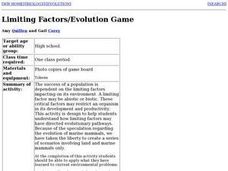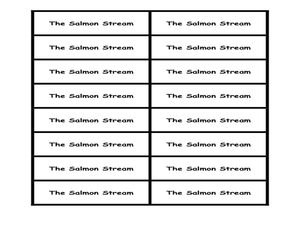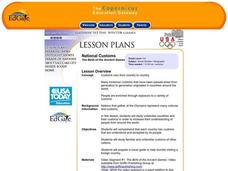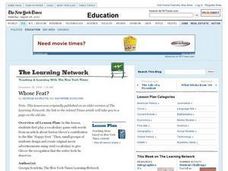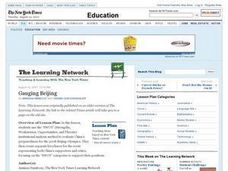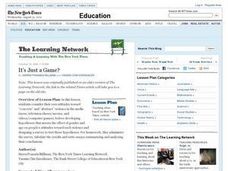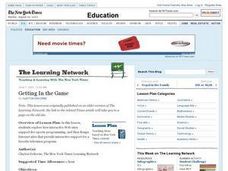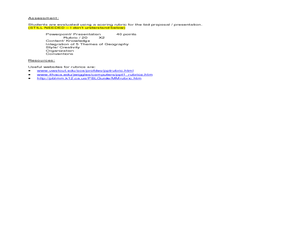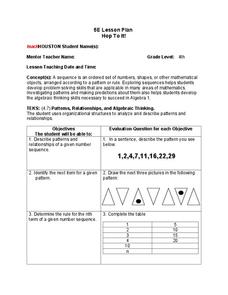Curated OER
Limiting Factors/Evolution Game
Young scholars play a board game with provided cards which help them realize that limiting factors may restrict an organism in its development and productivity and direct evolutionary pathways.
Curated OER
Brain Booster
In this daily math problem activity, students create a hundreds board template using the online activity format. Students choose their starting number and hit submit to generate the hundreds board activity.
Curated OER
Game: Turkey Put Together
Young scholars play a game using a symbol of Thanksgiving - the turkey. In this Thanksgiving game lesson, students divide into teams and participate in a relay race to create a turkey.
Curated OER
Playing with History
Students consider the elements that make computer games compelling, then use these elements to develop game 'narratives' based on historic events.
Curated OER
Flight of the Imagination
Young scholars study the success of video games by reading an online article. They work in groups to design settings, storylines, characters and technical features for their own fantasy video games. Finally, they write scripts for...
Curated OER
Oh, the Places You'll Go!
Students read about and discuss the fifty-three recommended travel destinations for 2008 from the Travel section of The New York Times. They list three places they would each like to visit, read and discuss the news article, and create...
Curated OER
Introducing Powers and Models II: Multiplication Rummy
Students practice their multiplication table using a game to increase speed and accuracy. In this multiplication activity, students distribute 5 random number cards to each player (2-5 players) and they "play" if their hand includes 3...
Curated OER
Dolphins
Young scholars explore sea life. In this cross curriculum fine arts, science, and P.E. "dolphins" instructional activity, students sing songs and play games about dolphins, perform water experiments, create mosaics, and use their five...
Curated OER
The Salmon Stream and Vegetation
Students explore the ecosystem and food chain by researching Pacific Salmon. In this fish habitat lesson, students discover the life cycle for salmon, where they spawn and what they eat to survive the harsh elements. Students participate...
Curated OER
National Customs: The Birth of the Ancient Games
Learners discover that different countries have different customs. Using the internet, they research the familiar and unfamiliar customs of a country they are interested in. They work together to create a travel brochure to help...
Curated OER
Design a Spinner
Spinners are usually used in board games not for math, right? Develop your class's understanding of ratios and probabilities with a spinner activity sheet that will require them to draw spinners according to specifications.
Curated OER
Tax Jeopardy
Create a glossary of tax-related vocabulary and clip New York Times articles that present tax procedure in action, in preparation for participating in a tax quiz bowl. Young economists explore allegations that "Survivor" Richard Hatch...
Discovery Education
Sonar & Echolocation
A well-designed, comprehensive, and attractive slide show supports direct instruction on how sonar and echolocation work. Contained within the slides are links to interactive websites and instructions for using apps on a mobile device to...
Curated OER
Sustainability and Extinction
Galapagos Penguins are the only penguins on earth that live north of the equator (in the wild). In this last lesson plan a discussion on how the Galapagos islands developed their populations and diversity sparks the introduction. Two...
Curated OER
Whose Feat?
Play a vocabulary game with words from an article about Savion Glover's contribution to the film "Happy Feet." Then, small groups of students design and create original movie advertisements using vivid vocabulary to give Glover the...
Curated OER
Gauging Beijing
Learners examine the responsibilites of country's chosen to host the Olympics. After reading an article, they discuss how China is preparing for the 2008 Summer Games. They focus on the country's strengths, weaknesses, opportunities...
Curated OER
It's Just a Game?
Students consider their attitudes toward concrete and abstract violence in the media before developing hypotheses that assess the effect of gender and age on people's attitudes toward such violence and designing a survey to test those...
Curated OER
Getting In the Game
Students explore how interactive Web sites support live sports programming, and then design Internet sites that provide interactive support for a favorite television program. They present their mock ups to the class.
Curated OER
Who's Up for the Olympic Challenge?:Integrating the 5 Themes of Geography with Olympic Bids
Learners explore geographical themes. In this problem solving geography lesson, students view a PowerPoint presentation about the Vancouver/Whistler Olympic bid. Learners analyze Vancouver as an Olympic site looking at location, place,...
Curated OER
Hop To It!
Students determine patterns. In this mathematics instructional activity, students act out a skit, play a sequence game, and complete patterns. Students use problems solving skills.
Perkins School for the Blind
Memory
When you are blind, your hands become your eyes, so learning how to discriminate between various objects through touch is a very important skill. Make a memory game by gluing common items onto cardstock. The kids feel, identify, and then...
Get Reading Right
Phonic Noughts and Crosses: v, w, y, z, j, n, k, e
Another version of noughts and crosses, the classic English game known as tic-tac-toe in American. This fundamental phonics matching activity uses the letters v,w,y,z,j,n,k,and e, in CVC words that are great words for beginning blending....
Curated OER
Trig Tic-Tac-Times
In this trigonometry worksheet, students play a skill review game that involves the problem solving strategy of working backward. The game is similar to tic-tac-toe using the trigonometric ratios. The one page worksheet provides the...
Curated OER
Number After Bingo 1-15
Using a number line, as a class, discuss the concept of the number after. Choosing numbers on the number line, ask your kindergartners what number comes next and point to that number. Once the class has this concept down, pair-up and...


